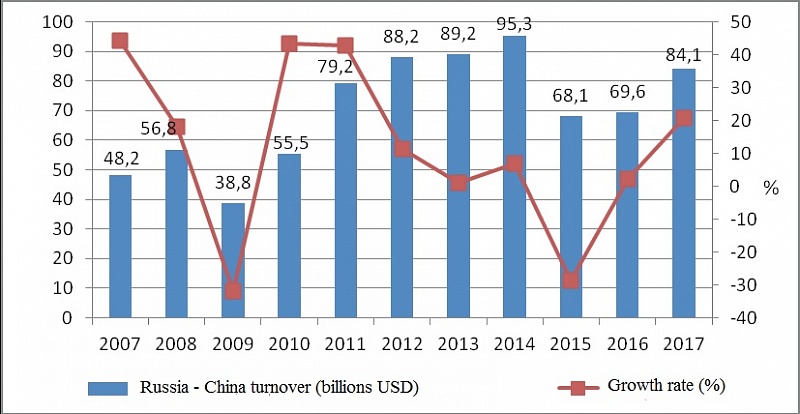Putin's Visit to China: What Next for Sino-Russian Relations?
In
Log in if you are already registered
The upcoming meeting between Vladimir Putin and Xi Jinping is the main political event of the year in terms of Russian-Chinese relations. On the agenda is implementation of the agreement to reach a $200 bln bilateral trade level by 2020, the task that was assigned by the leaders of two countries. The key precondition for the success of this agreement is shifting to a new model of cooperation, with more connected production chains and diverse investment ties.
According to The Annual Plan for Regular Foreign Visits between Russia and China, Putin will arrive for a three-day visit to China on June 8, 2018. It will be his first visit to the PRC after recent elections. This meeting will have the important goal of specifying the new directions for bilateral development.
"Strategic cooperation with China is one of the main priorities of our foreign policy. Our bilateral relations have reached a high level and serve as an example of international dialogue between two states in the modern world", says Yury Ushakov, the aide to the Russian president in charge of international affairs.
The year 2018 has seen important events in Russia and China. The leaders of the two countries were re-elected for a further term of office; both governments were changed; in China the new members of the Standing Committee took office. This internal political cycle decreased the intensity of mutual contacts, but starting in mid-March, contact intensity returned to its previous level. In April there was an exchange of official visits between Ministers of Foreign Affairs and Defense Ministers and the Chinese Minister of Public Security, Guo Shengkun, visited Russia; in May, the Secretary of the Russian Security Council, Nikolai Patrushev, and Chief Justice of the Russian Supreme Court, Vyacheslav Lebedev, visited Beijing; the Vice President of the PRC, Wang Qishan, made his first foreign visit in his new position to the St. Petersburg International Economic Forum; in early June, Sergey Lavrov and Wang Yi had a round of bilateral discussions during the meeting of BRICS foreign affairs ministers in Pretoria.
The current Russian and Chinese leaders have already met more than 20 times; there are good personal relations between them. Putin often uses the words "my friend" when he refers to Xi Jinping during official interviews. This kind of relationship between leaders has set the tone for all levels of communication between Russian and China.
The upcoming visit will start from Beijing, where Putin and Xi Jinping will conduct negotiations in an extended format. The heads of state will discuss bilateral relations, regional and global issues, as well as priority spheres of cooperation – the development of digital technologies in the industrial, infrastructure and energy sectors, including electric power engineering and alternative energies that are considered to be the drivers for boosting reciprocal trade.
The peculiar trait of Russian-Chinese economic relations is the imbalance in the trade structure. The share of energy resources exceeds 60% of the total exported from Russia. In 2017 bilateral trade volume showed 20% growth and exceeded $84 bln.

In the first quarter of 2018, it reached $23 bln with 27% growth (compared to the same period in the previous year).
In 2017, Russia became the largest exporter of crude oil to China (60 mln ton, +14% compared to 2016). "The Eastern Siberia – Pacific Ocean" oil pipeline in the Chinese sector had a double increase in pipeline capacity (up to 30 mln tons per year). Forecasts predict that the export volume of energy resources will increase within the next few years.
The “Yamal LNG” liquefied natural gas plant project (of which China owns 20% via CNPC and 9.9% via the Silk Road Fund) opened its first line with capacity of 5.5 million tonnes of liquefied natural gas per year. The full 3-line capacity (16.5 million tonnes) is to be achieved by 2021 and the main export market for the "Yamal LNG" will be China.
As of May 2018, there were 1800 km (83%) of "The Power of Siberia" natural gas pipeline that had been constructed. Four years ago the Russian - Chinese 30-year gas deal cost $400bln and it was called “the contract of the century”. It is expected that Chinese consumers will receive the first gas in 2019; it will supply up to 5 billion cubic metres per annum initially, and 38 billion cubic metres per annum of natural gas after reaching full capacity.
The Russian government puts a lot of effort into differentiating and balancing export categories in trade with China. Starting from 2017 there has been a positive trend. The share of machinery and equipment, as well as exports of agricultural products has increased substantially. Both countries began to move away from cooperation on the basis of mega-projects. The focus of 2018-19 will be on regional cooperation, small and medium size companies’ interaction and the development of e-commerce as an important tool of bilateral trade.
During official visits Putin and Xi usually use the closed-door meeting format to discuss sensitive issues. This visit will be no exception. As stated by Foreign Minister Wang Yi: "The Chinese side regards the Russian president’s visit as one of the greatest importance in terms of scheduling the next phase of Sino-Russian relations". During the meeting the parties will discuss the situation in Syria and possible scenerios for the Iran nuclear deal. There is expected to be a detailed exchange of opinions about the Korean peninsula issue, especially right before the US-DPRK summit. Russia and China were the initiators of the so-called "road map" to Korean crisis settlement, support the measures to decrease tensions and advocate the denuclearization of the Korean peninsula in the long run.
In the afternoon, the Russian and Chinese leaders will travel on a new high-speed train, which will take them to Tianjin (a city 96 km away from Beijing). As a part of the cultural agenda Putin and Xi Jinping will attend an ice-hockey game between junior teams of both countries.
Russia and China attach great importance to promoting all-around cultural exchanges. In 2016-2017 more than 250 events were organized between the media communities of the two countries. In September 2017, the first joint university (Moscow State University and Beijing Institute of Technology) was opened in Shenzhen. It has been announced that 2018-2019 are the China-Russia interregional cooperation cross-years. It is expected that more than 100,000 Chinese football fans will visit Russia for the World Cup matches this summer.
As per accepted diplomatic practice, Putin and Xi will issue a joint statement. As usual a set of agreements about cooperation in different areas will be signed. A press conference is also scheduled at the end of the day, where the leaders will announce the results of the meeting.
On June 9-10, Putin will participate in the Shanghai Cooperation Organization (SCO) summit in Qingdao. The political and economic capabilities of the SCO have increased substantially after India and Pakistan obtained full membership status in 2017. Nowadays, the SCO provides a unique model for implementing different multilateral initiatives.
During the meeting of the Heads of State Council, there will be discussion of key regional issues – economic development, security problems, cooperation in the cultural sphere and ways to further optimize the SCO. The state leaders will announce the name of the next SCO Secretary General, sinceRashid Alimov‘s term of service expires in December. One of the candidates for the position is Vladimir Norov, a director of the Institute of Strategic and Regional Studies under the President of Uzbekistan.
Most probably, during the meeting of the Heads of State Council Putin will state the Russian position on the SCO’s current goals, with a special emphasis on antiterrorism activities and the need to settle regional conflicts. Moscow supports the idea of creating a Center for New Threats and Challenges Resistance under the SCO Regional Anti-Terrorist Structure. The Russian plan will be to establish a working group to monitor, identify and suppress any illegal drug trade as a terrorism-financing mechanism.
The SCO summits offer good opportunities for bilateral negotiations. The tripartite format of discussions will also be used. Putin, Xi Jinping and Khaltmaagiin Battulga are to discuss the prospects for the China-Mongolia-Russia Economic Corridor. In addition Putin plans to hold bilateral negotiations with the Mongolian president and, also planned are bilateral meetings with Pakistan’s President Mamnoon Hussain, with Tajikistan’s President Emomali Rahmon, with Iran’s President Hassan Rouhani and with Uzbekistan’s President Shavkat Mirziyoyev.
According to the official representatives of the Ministries of Foreign Affairs: "Russia and China believe that the upcoming visit of the Russian president will bring positive results and stimulate the development of bilateral relations."
This year is the fifth since the Belt & Road Initiative (BRI) was launched. The ultimate goal of the project is to build a community of common destiny. Moscow considers it a useful, important and promising initiative. It corresponds to Russian efforts within the Eurasian Economic Union (EEU). Putin’s idea of a big Eurasian partnership is oriented towards the same goals and allows EEU, SCO and ASEAN countries to coordinate national development strategies and multilateral integration platforms in order stimulate the growth of their economies.
In May 2018 The Trade-Economic Cooperation Agreement between the EEU and China was signed. It is oriented towards creating an international treaty framework for the participants, regulates the main trade procedures and is based on WTO principals. In detail, it regulates trade protection measures, phytosanitary measures, technical barriers to trade, customs cooperation, e-commerce and intellectual property spheres.
Experts say that it is a golden age of Sino-Russian relations, and it is difficult to disagree. The relations between Russia and China are "not allies, but allied" - border issues are resolved, both countries’ approaches to the most of the international topics coincide, bilateral turnover shows growth, there is even a personal friendship between the two nations’ leaders. They meet with each other more often than with any other leaders (about 5 times each year).
The upcoming visit of the Russian president to China is not the only opportunity for the leaders to talk in private. Later this year Putin will conduct bilateral negotiations with Xi Jinping at the BRICS, G20 and APEC summits. These meetings - together with large-scale political cooperation mechanisms and increasing economic and political pressure from Western countries – result in natural and steady improvements in bilateral ties between Russia and China.
First published in Italian Institute for International Political Studies (ISPI).
Deputy Director of the Institute of Far Eastern Studies (IFES) Russian Academy of Sciences, RIAC expert
Blog: One Belt One Road
Rating: 0




